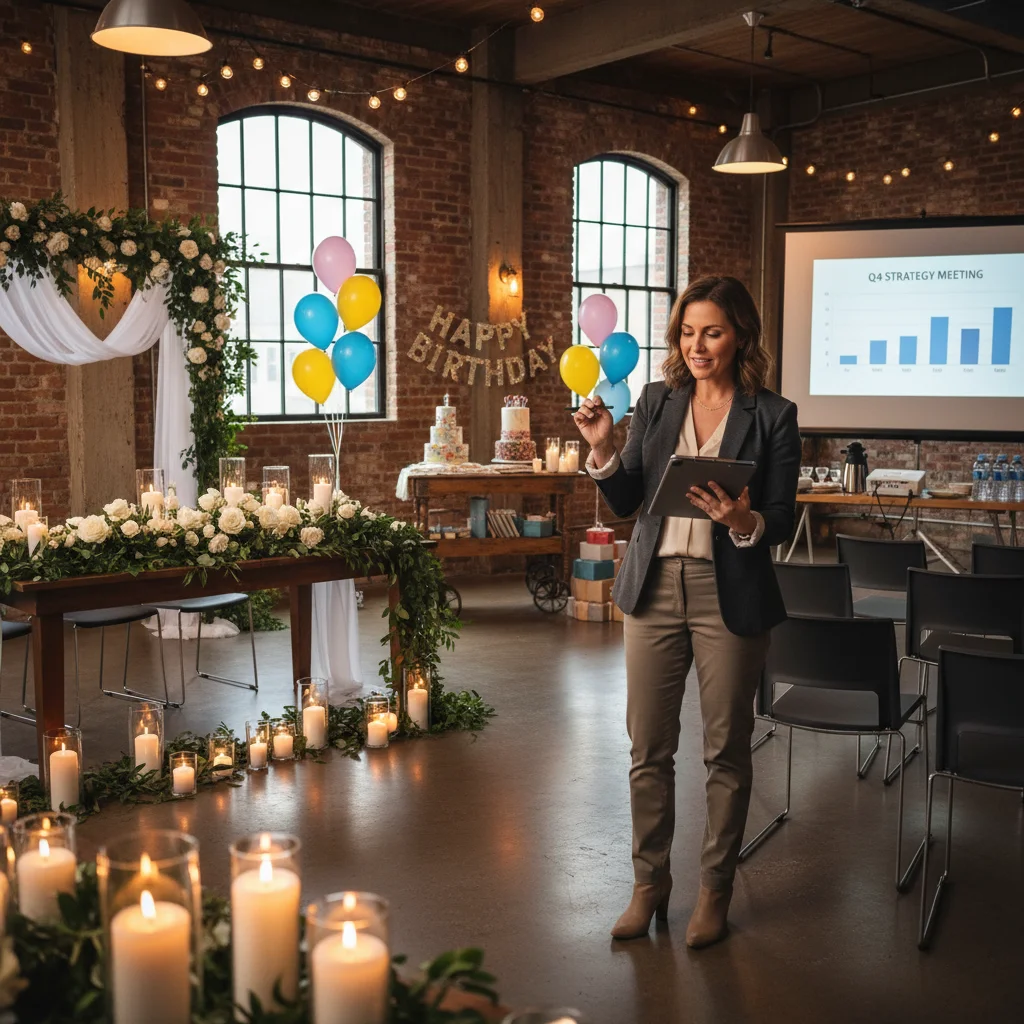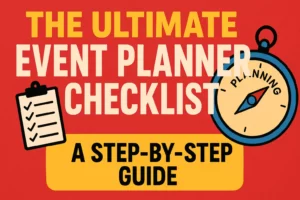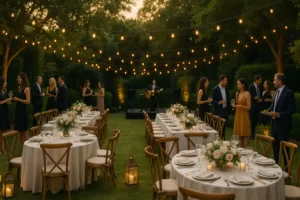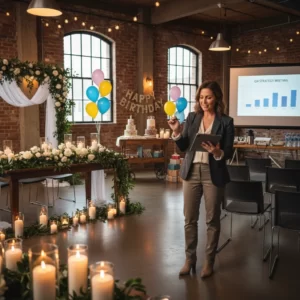Ultimate Event Planning Guide: Birthdays, Weddings & Corporate Events in the USA
TL;DR: Planning an event—whether a birthday, wedding, or corporate gathering—requires balancing vision, logistics, and budget. Event planners handle A–Z planning and creative design, while coordinators focus on day-of execution. Costs vary: full-service wedding planners can charge $5,000–$10,000+, birthday party planners $300–$10,000 depending on scale, and corporate events often run $5,000–$100,000+. Choosing the right venue is crucial for capacity, style, amenities, and accessibility. Save money by booking off-peak, bundling services, hiring partial planners, or using DIY elements. Start early, compare quotes, and connect with local experts via platforms like GreatEvent to ensure a stress-free, memorable celebration.
Whether you’re organizing a milestone birthday bash, a dream wedding, or a large corporate conference, effective planning is key to a successful event. Professional event planners and coordinators can dramatically reduce stress by managing logistics, vendors, and timelines. In fact, event planners are often described as “the architects” of an event – hired early to design the vision and handle budgets and bookings – while coordinators are the on-site “builders” who ensure smooth execution on the day. In the U.S., planner fees vary widely (often 10–20% of your budget or $25–$250+ per hour). In this guide, we break down the roles, typical costs, and venue considerations for birthdays, weddings, corporate gatherings (and other events) – plus money-saving tips. Ready to get started? Visit our profile pages to connect with experienced event professionals who can bring your vision to life.
For couples planning in the capital, browsing event venues in Washington DC is often the first step to finding the right backdrop for a wedding or special celebration.
Planners vs. Coordinators: Who Does What?
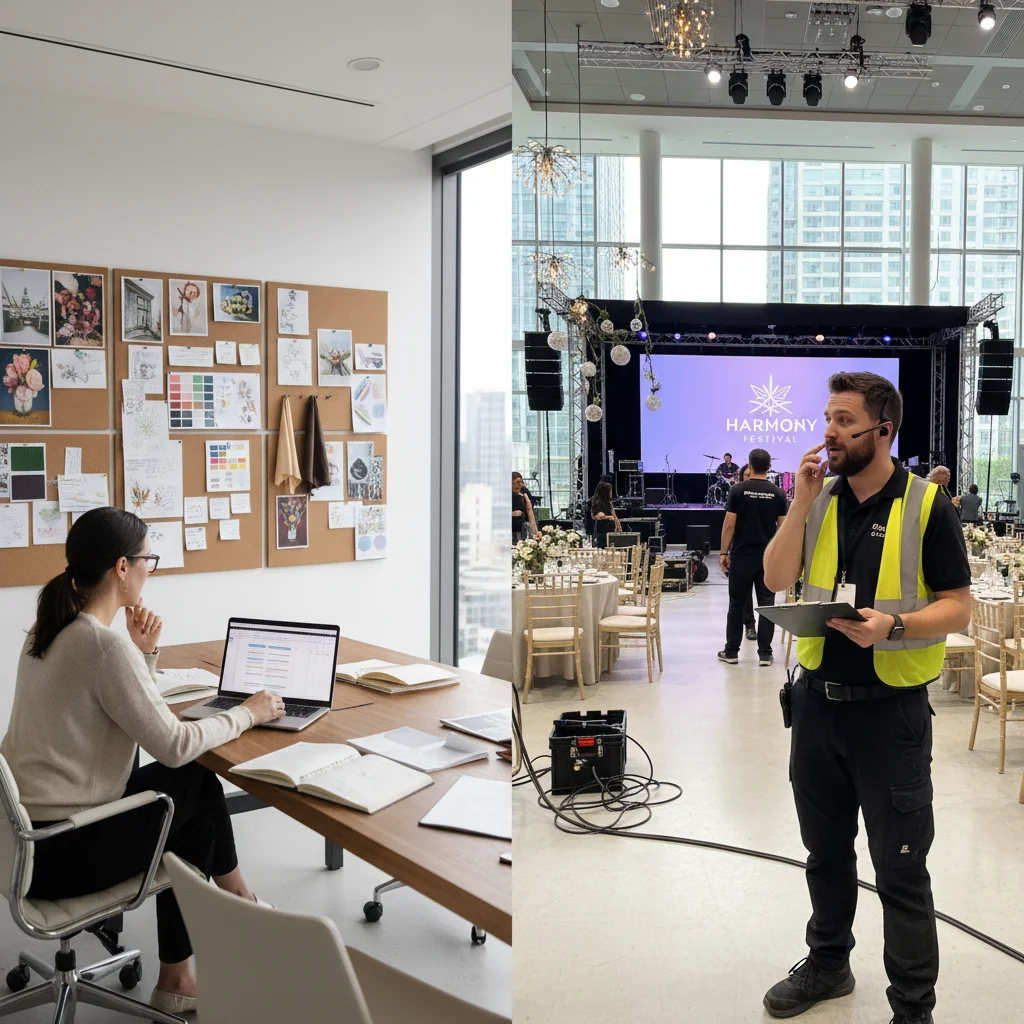
Understanding the difference between an event planner and a coordinator helps set expectations and budget.
- Event Planner (Designer): Hired early (as soon as you set the event date, often 6–12 months in advance for weddings or big conferences). Planners create the overall event concept, manage the budget, book venues and vendors, and oversee all creative and logistical details. They are the lead contact throughout the planning process and often work on marketing or design elements as well. Because planners do comprehensive A–Z planning, they command higher fees (commonly a flat fee or 10–20% of the total event budget). In big events like weddings or trade shows, full-service planners often charge thousands – for example, one guide notes full wedding planners typically charge 15–20% of the wedding cost.
- Event Coordinator (Doer): Hired later (usually 1–3 months before the event). Coordinators focus on finalizing details and managing the day-of execution. They compile the timeline, confirm vendor arrivals, coordinate setup and teardown, and troubleshoot any issues on-site. They rarely get involved in early vision or design decisions. Because their scope is narrower, coordinator fees are lower: typically a flat event-day rate (often $800–$2,000 for a full day) or hourly fees ($30–$75/hr). For example, a “day-of” wedding coordinator might cost $1,000–$2,000 for the event day, whereas hiring a planner for the entire wedding would be much higher.
If your event is in the capital, you may also want to explore venues in Washington DC that match the size and tone of your occasion.
Understanding these roles helps you decide what you need. Small events (like a kids’ birthday or a simple anniversary) may skip a planner altogether and just hire a coordinator or event staff. In contrast, large weddings, conferences, and festivals often benefit from both – the planner designs everything months ahead, and a coordinator ensures it all runs smoothly on the day.
Event Planner Fees: What to Expect by Event Type
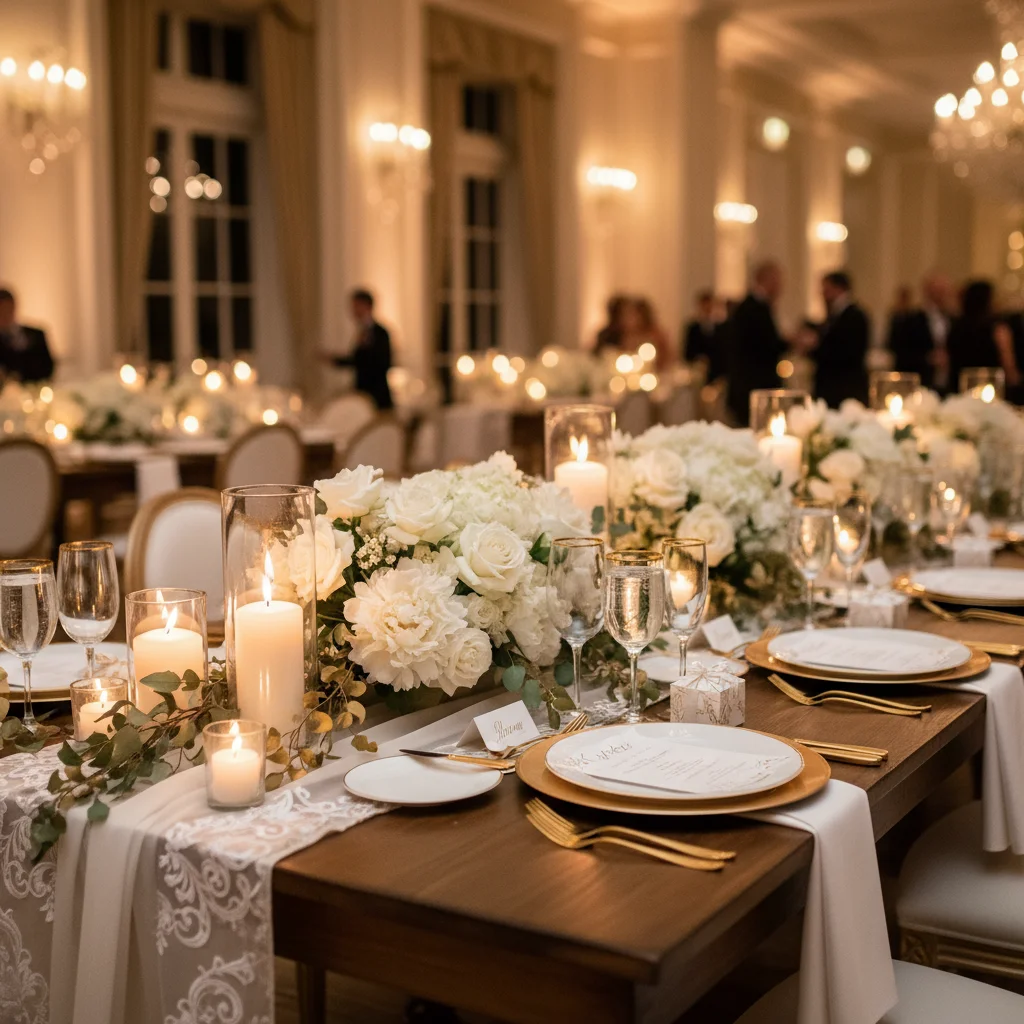
Event planning costs in the USA vary greatly by event type, size, and location. Here are some ballpark figures and models to guide your budget:
- Weddings: Wedding planners come in tiers. Full-service planners (involved from engagement through reception) typically charge $5,000–$10,000+ nationwide – roughly 15–20% of a typical wedding budget. Partial planners (handling only certain aspects) might run $1,500–$5,000. Day-of (month-of) coordinators oversee logistics on the wedding day and cost about $500–$2,500. For example, industry surveys report that day-of wedding coordination averages $1,200–$2,500, whereas a one-day birthday coordinator might be $500–$1,500.
Couples looking to maximize value may find inspiration by researching affordable wedding venues in San Antonio that offer elegant settings without overwhelming budgets.

- Birthday Parties: Simple birthday celebrations (especially kids’ parties) require much less work. Average party-planner fees nationally are around $500–$650. Small family or children’s parties often fall in the $300–$1,000 range for day-of help or basic packages. For large or elaborate birthday events (50–100+ guests, custom themes, high-end décor), fees can climb. These milestone parties often incur planner fees of $2,000–$10,000+. (For context: on a $3,000 birthday budget, a 15–20% planning fee would be $450–$600.) Rates also vary by city: new planners might charge $25–$40/hr, experienced ones $75–$150/hr (ZipRecruiter data show about $36/hr in Dallas vs $200/hr in NYC).
If you’re after luxury, some of the best wedding venues in San Antonio provide all-inclusive experiences, from catering to décor, making planning smoother.
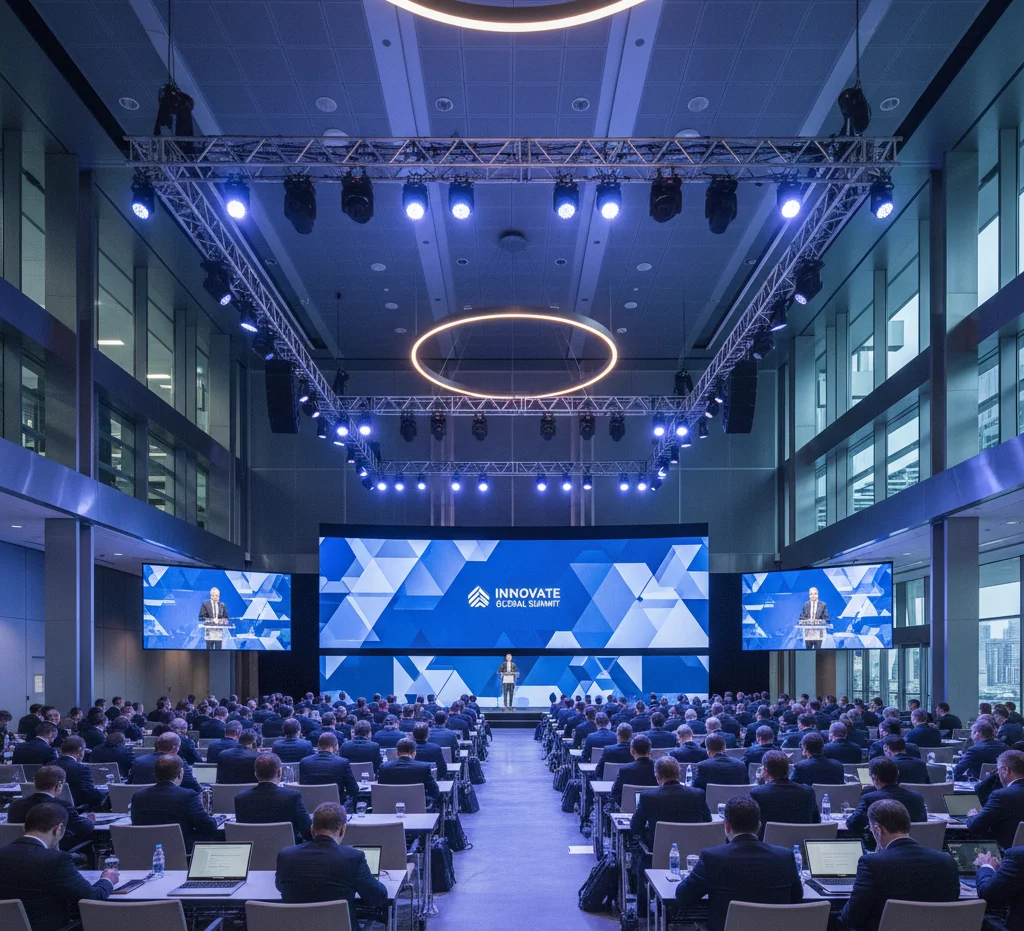
- Corporate Events: These can be among the priciest. Corporate conferences, trade shows or annual meetings often have big budgets ($5,000–$100,000+). Companies may use in-house planners or hire agencies. Planners for corporate events usually charge either flat project fees or around 10–20% of the overall budget. For large conferences, even day-of event managers or coordinators may be brought in at $30–$75/hr or daily rates. (Sometimes corporate coordinators are simply salaried staff with annual salaries of $40k–$60k.)
For unique atmospheres, exploring unique wedding venues in Washington DC can spark creative ideas that may also work for themed corporate gatherings or galas.
- Other Celebrations: Anniversaries, reunions, galas, and fundraisers fall in between. Intimate reunions or birthday dinners might need only a coordinator or event service, whereas anniversary milestones might benefit from partial planning. For example, some couples hire planners 2–6 months ahead for big birthdays or anniversaries. Charity galas often involve planners working for a percentage of donations; coordinators then manage auction or program logistics on event day. Remember: smaller events or mid-sized parties often require less planning time and therefore incur smaller fees.
Pricing Models: Event professionals typically charge by flat fee, percentage, or hourly rate. As a rule of thumb in the U.S.: full-service planners are often 10–20% of your budget, flat packages (e.g. a $2,000 day-of package) are common for well-defined services, and hourly consulting (typically $25–$250/hr depending on experience) is used for ad-hoc help. Always ask planners how they charge (flat, hourly, or percent) so you can compare quotes fairly.
Choosing the Right Venue
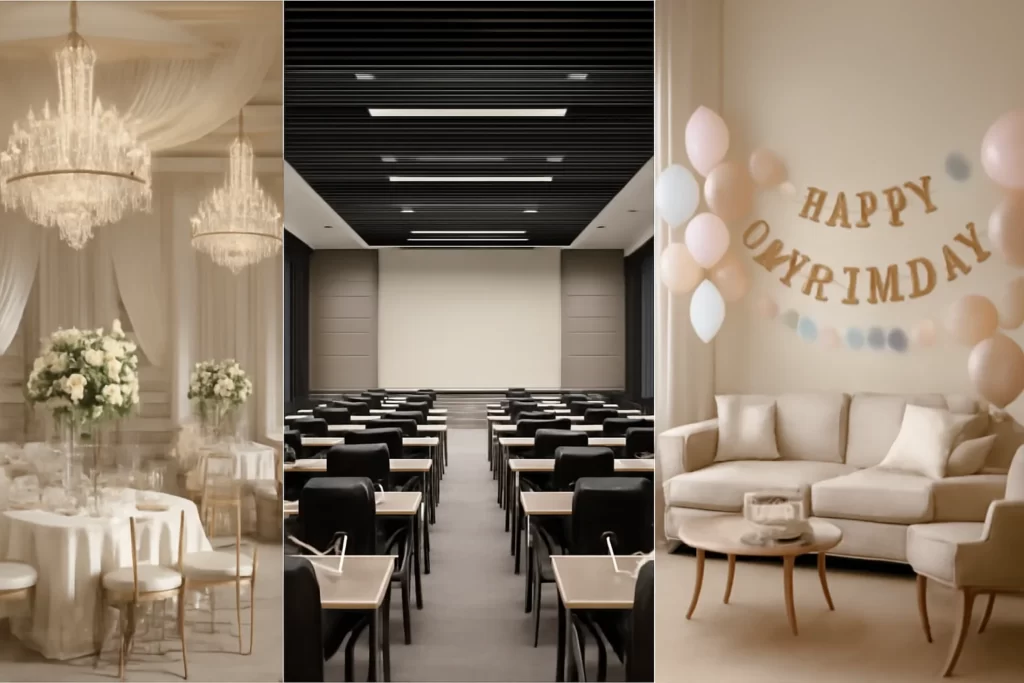
The venue you pick sets the stage – literally – for your event’s success. Different events have distinct venue needs, so consider these key factors:
- Event Type & Capacity: Make sure the venue fits your guest count and style. Weddings often call for scenic settings or spacious ballrooms, while corporate functions need meeting rooms with AV gear and networking spaces. For example, many couples searching for San Antonio wedding venues look for riverside or garden venues that offer beautiful backdrops. Corporate events require spaces with projectors, Wi-Fi, and breakout rooms. Smaller parties (birthdays, baby showers) do well in intimate halls or lounges.
When researching venues, some couples also check resources like Hotel Washington wedding cost to compare price ranges and inclusions at well-known spots.
- Location & Accessibility: Pick a convenient spot for most guests. Ideally, the venue is near major airports, public transport, and ample parking. If many out-of-town guests are expected, proximity to hotels or shuttles is a big plus. Smooth transportation and parking improve guest experience.
- Amenities & Services: What does the venue itself provide? Many venues offer internal catering, bars, on-site event staff, audiovisual equipment, and furniture setup as part of their service. A venue that includes tables, chairs, sound systems or even decor rentals can significantly simplify planning. Read fine print: some venues may require you to use their in-house caterers or decorators. Flexible spaces that allow your own vendors (and customizable menus or seating) give you more control.
For receptions specifically, exploring options for a Washington wedding reception can help couples find spaces that accommodate dancing, dining, and post-ceremony celebrations seamlessly.
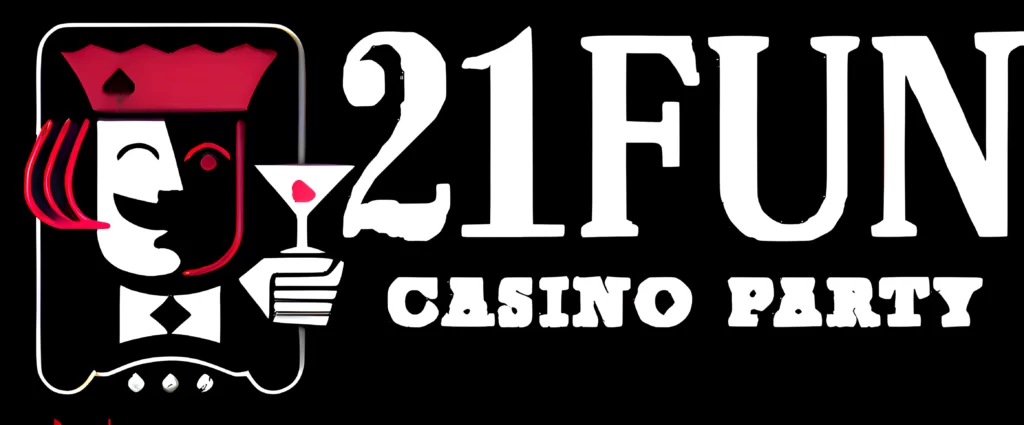
21Fun – Casino Party Rentals in California
- Budget Considerations: Venue costs depend on season, day of week, and included services. Peak wedding season or weekend dates usually cost more. Booking off-peak (e.g. weekdays, Sundays, or winter months) often yields steep discounts – in San Antonio, Thursday/Sunday ceremonies can save ~40% on venue and vendor costs. Bundled packages (venue + catering + decor) can also be more economical than purchasing each service separately.
- Flexibility & Atmosphere: Finally, ensure the venue’s style matches your event’s vibe. A historic mansion or boutique hotel adds charm to a wedding, while a modern conference center might suit a tech meetup. Check if the space can be decorated to fit your theme and that it has the layout you need (separate ceremony and reception areas, dance floor, breakout rooms, etc.).
For guidance on structuring your event, resources like wedding ceremony and reception explain how to divide your celebration into meaningful parts while balancing logistics and flow.
In practice, research venues early. For example, San Antonio’s Riverwalk area has many affordable wedding venues that blend charm and value: places like Drury Plaza Hotel or SpringHill Suites Downtown Riverwalk offer elegant settings without a sky-high price. In Washington, D.C., you’ll find everything from grand historic hotels to free outdoor spaces – as one guide notes, DC venues range “from free public areas (with permits) to luxury hotels”. Knowing your budget and guest count before touring venues will save time. Use online tools (like GreatEvent’s directory) to compare local venue profiles and pricing up front.
Money-Saving Tips & Final Advice
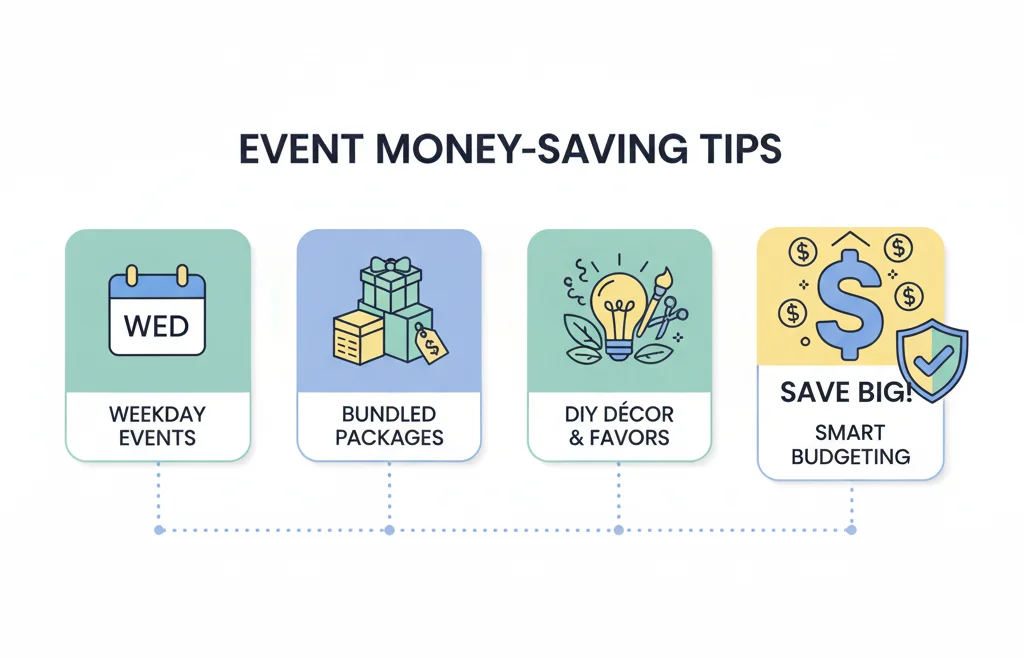
Even with a budget, you can plan a memorable event. Keep these strategies in mind:
- Limit Planner Hours: If full planning exceeds your budget, hire a partial planner or day-of coordinator instead. Day-of coordination (typically $500–$1,500) gives you professional oversight on the event day at a fraction of a full-service price. Many newer planners also offer introductory rates or hourly consulting (often 50% less than seasoned pros) to build their portfolios.
- Off-Peak Booking: As noted, scheduling your event on a weekday or off-season can yield huge savings. In fact, couples in San Antonio report 40%+ savings by choosing Thursday or Sunday weddings. Similarly, winter dates (January/February) often have 20–40% vendor discounts in many regions. Check local event calendars for slow periods in your city.
- Bundle & DIY: Opt for venues offering all-inclusive packages (venue + catering + decor). Many venues promote affordable bundled deals under $100/person. For vendors, consider package deals (e.g. DJ + lighting) or emerging professionals (photography and music students often charge lower rates). Do-it-yourself elements (digital invites, shared rentals) and small guest lists can also cut costs.
- Compare & Ask Questions: Get quotes from several planners or venues. Ask exactly what’s included. For example, clarify whether a quoted fee includes vendor commissions, taxes, or extra staff. It’s also wise to read reviews and see portfolios to ensure quality. greatEvent’s platform, for instance, allows you to browse planner profiles, compare services, and see past client feedback before reaching out.
- Plan Early: Finally, give yourself time. Booking top planners 6–12 months ahead (especially for popular wedding seasons or holiday corporate events) means you lock in expertise at more reasonable rates. Last-minute planning often forces rush fees and limited choices.

By combining savvy budgeting with the right expertise, you can pull off a great event at any price point. From DIY touches to professional guidance, there are options for every budget.
Ready to get started? Visit our event planner and venue profile pages to find the perfect partners for your occasion. You can “browse, compare, and book your ideal venue” or event planner and get all the details you need. Connect with local experts today and take the first step toward a stress-free, unforgettable celebration!
Frequently Asked Questions
What is the main difference between an event planner and an event coordinator?▾
Event planners are hired early to create the event vision, manage budgets, book vendors, and oversee the whole planning process. Coordinators are hired closer to the event date to manage on-site logistics and ensure smooth execution on the day itself.
When should I hire an event planner versus a coordinator?▾
Hire a planner 6–12 months in advance for full event design and management, especially for weddings or large conferences. Hire a coordinator 1–3 months before the event to handle day-of logistics and vendor coordination.
How much do event planners typically charge for weddings?▾
Full-service wedding planners usually charge 15–20% of the wedding budget or $5,000–$10,000+. Partial planners and day-of coordinators charge less, from $1,500–$5,000 and $500–$2,500 respectively.
What are the typical fees for birthday party planners?▾
Simple children’s parties often cost $300–$1,000 for day-of coordination or basic packages. Large or milestone birthday parties can cost $2,000–$10,000+ depending on the scale and customization.
How do corporate event planning fees compare to other events?▾
Corporate events usually have bigger budgets ($5,000–$100,000+) and planners charge 10–20% of the total budget or flat fees. Corporate coordinators may be salaried or charge $30–$75 per hour for event management.
What factors should I consider when choosing a venue for my event?▾
Consider event type and guest count, location and accessibility, amenities and services provided, budget, and whether the venue atmosphere fits your event’s vibe. Check if the venue allows outside vendors and if it offers necessary equipment like AV gear.
How can I save money when planning an event?▾
Limit planner hours by hiring day-of coordinators, book off-peak dates or weekdays, choose bundled venue packages, consider emerging professionals for vendors, and do some DIY tasks like digital invitations.
What are some common pricing models used by event planners?▾
Event planners may charge a flat fee, a percentage of the event budget (typically 10–20%), or hourly consulting fees ranging from $25 to $250 per hour depending on experience.
Why is it important to book event planners or venues early?▾
Booking early (6–12 months ahead) secures the best availability, expertise, and pricing. Last-minute planning often leads to rush fees, fewer vendor choices, and more stress.
Can small events benefit from hiring event professionals?▾
Yes, even small birthday dinners or intimate reunions can benefit from hiring day-of coordinators or event staff to help with logistics, ensuring the event runs smoothly with less stress.
Related Post
Contact Us
Please provide your contact information with event details. You will be contacted soon.

